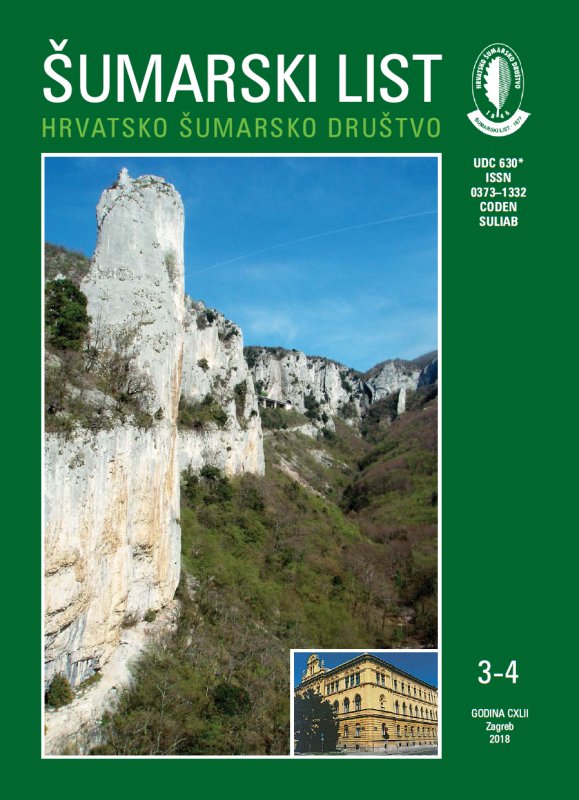
broj: 3-4/2018
pdf (8,47 MB) |
|
||||||||||||||
| RIJEČ UREDNIŠTVA | ||
| Uredništvo | ||
| FOREST REGULATIONS AND POLITICS pdf HR EN | 121 | |
| IZVORNI ZNANSTVENI ČLANCI | ||
| Joso Vukelić, Dario Baričević, Igor Poljak, Mario Vrček, Irena Šapić | UDK 630* 188 (Alnus incana L.)(001) https://doi.org/10.31298/sl.142.3-4.1 | |
| PHYTOCOENOLOGICAL ANALYSIS OF GREY ALDER (Alnus incana /L./ Moench supsp. incana) FORESTS IN CROATIA pdf HR EN | 123 | |
| Ivan ANDRIĆ, Anamarija JAZBEC, Valentino PINTAR, Davorin KAJBA | UDK 630* 181.8 + 111 (001) https://doi.org/10.31298/sl.142.3-4.2 | |
| MODELLING THE TIMING OF LEAF UNFOLDING IN PEDUNCULATE OAK (Quercus robur L.) CLONAL SEED ORCHARD pdf HR EN | 137 | |
| Branimir ŠAFRAN, Matija JUG, Kristijan RADMANOVIĆ, Marin HASAN, Kristijan AUGUSTINOVIĆ, Krešimir VUČKOVIĆ, Stjepan RISOVIĆ | UDK 630* 831 (001) https://doi.org/10.31298/sl.142.3-4.3 | |
| CONTRIBUTION TO THE RESEARCH ON WOOD PELLET CHARACTERISTICS FROM TUROPOLJE AREA pdf HR EN | 149 | |
| Summary The paper deals with some quality characteristic of wood pellets from Turopolje area. The samples of pedunculate oak (Quercus robur L.), European hornbeam (Carpinus betulus L.), narrow-leaved ash (Fraxinus angustifoliaVahl.), European alder (Alnus glutinosa L.) and black poplar (Populus nigra L.) were collected. Collected and debarked samples were crushed by a mill with knives to 2.00 mm granulation. The content of water, ash and calorific value were examined on samples. The ash content was determined separately for the bark and the wood. The ash content in the barks shows a high rate in pedunculate oak which is 13.64 % and hornbeam with 11.91 %, while in other species the ash content in a bark is between 7 and 10 %. The ash content of a debarked wood shows the following values: 0.63 % for the oak, 0.50 % for the ash, 0.46 % for the hornbeam. Values of the ash content in the alder and the poplar were 0.4 %. Results indicate the need for debarking in pellet production in order to obtain the quality of class A1 and A2 pellet. By determining the calorific value the best results were determined in the black poplar sample which is 19.63 MJ/kg, and the lower value was measured in hornbeam sample 18.94 MJ/kg. Furthermore, the mentioned samples were mixed and 3 mixture groups were formed. The share of hard broad-leaved trees of oak, hornbeam and ash in each individual mixture was 60 %,while in the remaining 40 %,alder (20 %) and poplar (20 %) equally participated. Formed material mixtures APA (ash 60 : poplar 20 : alder 20), OPA (oak 60 : poplar 20 : alder 20) and HPA (hornbeam 60 : poplar 20 : alder 20) were pressed into pellets by hydraulic laboratory press in 2 forces (3.0 and 6.0 kN) and 2 temperatures (150 and 200 °C). After pressing, pellets were left for 15 days to stabilise in dimension and their dimension and density were determined. Then, pellets were checked for pressure strength in a radial direction by a testing machine. Pellets from all the mixtures, pressed by a force of 6.0 kN at 200 °C showed a high density in the range from 1 207 – 1 234 kg/m3. Pellets of basic ash mixture at force of 3.0 kN and at 200 °C gave high density≈ 1200 kg/m3, while the smallest density was generally given by pellets of basic hornbeam mixture in all pressing regimes. The results of pressure strength in radial direction give best results in pellets pressed at 6.0 kN and 200 °C which is 13.59 MPa with the basic ash mixture, 11.1 MPa with the basic oak mixture and 9.06 MPa of basic hornbeam mixture. If the pressure strength of a pellet is considered collectively according to the mixture, pellets made from the mixture of ash, poplar and alder give significantly better results in comparison to other two mixtures. Key words: wood pellets; ash content; calorific value; pellet density; pressure strength | ||
| Győző F. HORVÁTH, Dániel TÓTH | UDK 630* 451 (001) https://doi.org/10.31298/sl.142.3-4.4 | |
| ABUNDANCE OF BANK VOLE (Myodes glareolus Schreb.) AS AN INDICATIVE FACTOR OF DIFFERENT FOREST STRUCTURE AND MANAGEMENT IN THE DRAVA PLAIN REGION pdf HR EN | 161 | |
| Andreja NÈVE Repe, Maarten de GROOT, Maja JURC | UDK 630* 443 + 453 (001) https://doi.org/10.31298/sl.142.3-4.5 | |
| ASSEMBLAGES OF OPHIOSTOMATOID FUNGI VECTORED BY Ips amitinus (Coleoptera: Scolytinae) ON NORWAY SPRUCE DEPEND ON COLONIZATION TIME, POSITION ON THE HOST TREE AND DEVELOPMENT STAGE pdf HR EN | 171 | |
| PRETHODNO PRIOPĆENJE | ||
| Mirza DAUTBAŠIĆ, Kenan ZAHIROVIĆ, Osman Mujezinović, Josip MARGALETIĆ | UDK 630* 453 https://doi.org/10.31298/sl.142.3-4.6 | |
| FIRST RECORD OF OAK LACE BUG (Corythucha arcuata) IN BOSNIA AND HERZEGOVINA pdf HR EN | 179 | |
| PREGLEDNI ČLANCI | ||
| Srđan DRAŽIĆ, Milorad DANILOVIĆ, Dušan STOJNIĆ, Velibor BLAGOJEVIĆ, Radovan LUČIĆ | UDK 686 + 383 https://doi.org/10.31298/sl.142.3-4.7 | |
| OPENNESS OF FORESTS AND FOREST LAND IN THE BOSNIA AND HERZEGOVINA ENTITY REPUBLIC OF SRPSKA pdf HR EN | 183 | |


